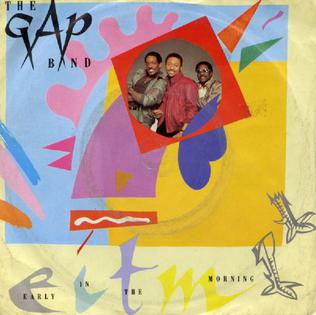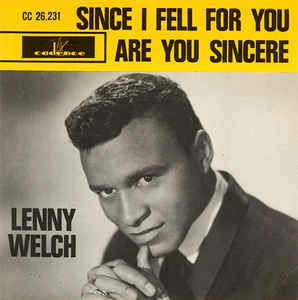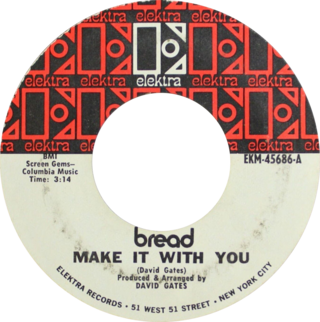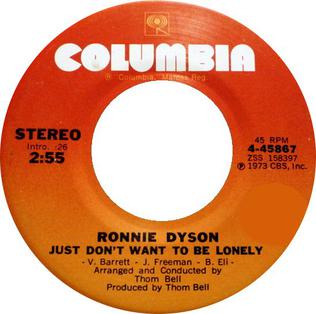Related Research Articles

"Early in the Morning" is a song originally performed by The Gap Band, and written by member Charlie Wilson and producers Lonnie Simmons and Rudy Taylor.

"Le Freak" is a 1978 funk / disco song by American R&B band Chic. It was the band's third single and first Billboard Hot 100 and R&B number-one hit song. Along with the tracks "I Want Your Love" and "Chic Cheer", "Le Freak" scored number one on the disco charts for seven weeks. The single achieved sales of 7 million and also scored number seven in the UK Singles Chart.

"Boogie Wonderland" is a song by American band Earth, Wind & Fire with the Emotions, released in April 1979 on Columbia Records as the first single from their ninth album, I Am (1979). The song peaked at number 14 on the US Billboard dance chart, number six on the Billboard Hot 100, and number two on the Billboard Hot Soul Singles chart. It was certified gold in the US and platinum in the UK. "Boogie Wonderland" was Grammy nominated in the categories of Best R&B Instrumental Performance and Best Disco Recording. It won the Grammy for Best R&B Instrumental Performance.

"Family Affair" is a 1971 number-one hit single recorded by Sly and the Family Stone for the Epic Records label. Their first new material since the double A-sided single "Thank You "/ "Everybody Is a Star" nearly two years prior, "Family Affair" became the third and final number-one pop single for the band. In 2021, Rolling Stone magazine ranked the song 57th on their list of the 500 Greatest Songs of All Time. The cover version by John Legend, Joss Stone, and Van Hunt, won the Grammy Award for Best R&B Performance by a Duo or Group with Vocals at 49th Annual Grammy Awards.

"Jive Talkin'" is a song by the Bee Gees, released as a single in May 1975 by RSO Records. This was the lead single from the album Main Course and hit number one on the Billboard Hot 100; it also reached the top-five on the UK Singles Chart in the middle of 1975. Largely recognised as the group's comeback song, it was their first US top-10 hit since "How Can You Mend a Broken Heart" (1971).

"Until You Come Back to Me (That's What I'm Gonna Do)" is a song written by Morris Broadnax, Clarence Paul, and Stevie Wonder. The song was originally recorded by Stevie Wonder in 1967, but his version was not released as a single and did not appear on an album until 1977's anthology Looking Back. The best-known version of this song is the 1973 release by Aretha Franklin, who had a million-selling top 10 hit on Billboard charts. The song reached No. 1 on the R&B chart and No. 3 on the Hot 100 chart in 1974. It became an RIAA Gold record.
"I Only Have Eyes for You" is a romantic love song by composer Harry Warren and lyricist Al Dubin, written for the film Dames (1934) when Dick Powell introduced it. Several successful recordings of the song were made in 1934; later, there were charted versions by The Flamingos (1959) and Art Garfunkel (1975).

"Good Rocking Tonight" is a jump blues song originally released in 1947 by its writer, Roy Brown and was covered by many recording artists. The song includes the memorable refrain, "Well I heard the news, there's good rocking tonight!" The song anticipated elements of rock and roll music.

"I'll Never Fall in Love Again" is a popular song by composer Burt Bacharach and lyricist Hal David that was written for the 1968 musical Promises, Promises. Several recordings of the song were released in 1969; the most popular versions were by Dionne Warwick, who took it to number 6 on Billboard magazine's Hot 100 and spent three weeks topping the magazine's list of the most popular Easy Listening songs, and Bobbie Gentry, who topped the UK chart with her recording and also peaked at number 1 in Australia and Ireland, number 3 in South Africa and number 5 in Norway.

"Break It to Me Gently" is a pop song written by blues musician Joe Seneca with lyrics by Diane Lampert. Both Brenda Lee and Juice Newton met with considerable success with their versions of the song.

"Since I Fell for You" is a blues ballad composed by Buddy Johnson in 1945 that was first popularized by his sister, Ella Johnson, with Buddy Johnson and His Orchestra.
"(Now and Then There's) A Fool Such as I" is a popular song written by Bill Trader and published in 1952. Recorded as a single by Hank Snow it peaked at number four on the US country charts early in 1953.
Belle Epoque was the name of a female vocal trio, based in Paris, France. The group first rose to popularity during the late 1970s with a disco remake of the song "Black Is Black", originally a hit in 1966 for the Spanish group Los Bravos.

"Make It with You" is a song written by David Gates and originally recorded by American pop-rock group Bread, of which Gates was a member. Gates and drummer Mike Botts are the only members of the group to appear on the recording, which was Bread's only No.1 hit on the Billboard Hot 100 chart.

"Blame It on the Boogie" is a song released in 1978 by English singer-songwriter Mick Jackson. It has been covered by numerous other artists, including The Jacksons. The song was performed on Musikladen, Aplauso, Sonja's Goed Nieuws Show and ABBA Special: Disco in the Snow Part 1, Luis Miguel spanish version "20 años album"

"Hi-Jack" is a 1974 r&b and funk disco based song written by Spanish musician Fernando Arbex and originally recorded by his group Barrabás for their album ¡Soltad a Barrabás!. While their version of the song was a huge success in their native Spain, going all the way to Number one over there, the song flopped in America, stalling at just number No. 104 on the Bubbling Under the Billboard Hot 100 Charts in July 1975. It was later a hit single for jazz flautist Herbie Mann.
"I Wonder" is a 1944 song written and originally performed by Pvt. Cecil Gant. The original version was released on the Bronze label, before Gant re-recorded it for the Gilt-Edge label in Los Angeles. The record made it to number one on the Juke Box Race Records chart and was Pvt. Gant's most successful release. In February 1945, pianist, Roosevelt Sykes hit number one with his version of the song. Sykes' version is notable in that it replaced Gant's version, at number one on the Juke Box Race Records chart.
"Last Date" is a 1960 instrumental written and performed by Floyd Cramer. It exemplifies the "slip note" style of piano playing that Cramer made popular. It peaked at number 11 on the country chart and at number two on the Hot 100 behind "Are You Lonesome Tonight?" by Elvis Presley. Cramer's recording inspired a number of successful cover versions, including a vocal adaptation by Conway Twitty.
"Guitar Man" is a 1967 song written and originally recorded by Jerry Reed, who took his version of it to number 53 on the Billboard country music charts in 1967. Soon after Reed's single appeared, Elvis Presley recorded the song with Reed playing the guitar part, and it became a minor country and pop hit.

"Just Don't Want to Be Lonely" is a song written by Bobby Eli, John Freeman and Vinnie Barrett, originally recorded in 1973 by Ronnie Dyson and popularized internationally by The Main Ingredient. Dyson's version reached No. 60 in the US Pop chart, No. 30 Adult Contemporary, and No. 29 in the US R&B chart. Its flipside was "Point of No Return", a song written by Thom Bell & Linda Creed.
References
- ↑ Marcia Griffiths- "Electric Boogie" single @Discogs.com Retrieved 11-15-2014.
- ↑ "Marcia Griffiths – Today's 1 Hit Wonder @ 1 [VIDEO]". Wblk.com. 2013-02-18. Retrieved 2013-09-07.
- ↑ Marcia Griffiths - Topic (2016-04-16), Electric Boogie, archived from the original on 2017-11-16, retrieved 2018-03-23
- ↑ Whitburn, Joel (2013). Joel Whitburn's Top Pop Singles, 14th Edition: 1955-2012. Record Research. p. 359.
- ↑ Whitburn, Joel (2004). Top R&B/Hip-Hop Singles: 1942-2004. Record Research. p. 239.